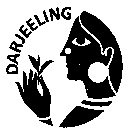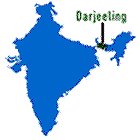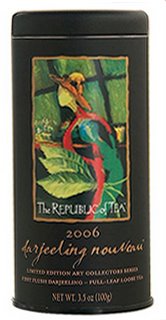Citable No. 42: TTAB Sustains India Tea Board's Section 2(d) Opposition Re "DARJEELING" Certification Marks
In its 42nd citable decision of 2006, the Board sustained a Section 2(d) opposition to registration of the mark DARJEELING NOUVEAU for tea ["DARJEELING" disclaimed], finding the mark likely to cause confusion with the registered certification marks DARJEELING and DARJEELING & Design (shown below). The Board dismissed Applicant's counterclaim to cancel the DARJEELING word mark registration on the Section 14(5)(A) ground that Opposer "does not control, or is not able legitimately to exercise control over, the use of the mark." Tea Board of India v. The Republic of Tea, Inc., 80 USPQ2d 1881 (TTAB 2006).
 Opposer is a non-trading, non-profit body established by the Government of India under the India Tea Act of 1953 for the purpose of controlling the India tea industry. Darjeeling is a district located in the state of West Bengal, India, where tea has been grown and produced in 87 "tea gardens" for 150 years. Applicant Republic of Tea is a California-based purveyor of teas, and is a licensee of the Tea Board and a "certified user" of the logo mark, which it uses to represent that its product consists of 100% Darjeeling tea.
Opposer is a non-trading, non-profit body established by the Government of India under the India Tea Act of 1953 for the purpose of controlling the India tea industry. Darjeeling is a district located in the state of West Bengal, India, where tea has been grown and produced in 87 "tea gardens" for 150 years. Applicant Republic of Tea is a California-based purveyor of teas, and is a licensee of the Tea Board and a "certified user" of the logo mark, which it uses to represent that its product consists of 100% Darjeeling tea.The logo registration states, "The certification mark, as used by persons authorized by certifier, certifies that a blend of tea contains at least sixty percent (60%) tea originating in the Darjeeling region of India, and that the blend meets other specifications established by the certifier." The word mark registration similarly states that the tea contains "at least 100%" [sic!] tea from the Darjeeling region.
Genericness: In its 61-page opinion, the Board first considered Applicant's counterclaim to cancel the DARJEELING word mark registration. Applicant contended that the mark "has lost its significance as an indication of geographic source and among the consuming public has become a generic term denoting a certain type of tea." In support, Applicant pointed to Opposer's alleged failure to police its marks, years of uncontrolled use, deficiencies in the Board's regulations, and the "lack of widespread use of the logo mark by third parties." It also submitted dictionary definitions, survey results, and evidence of third-party usage.
The Board observed that "[a] certification mark used to certify regional origin as well as qualities and characteristics associated with the origin will not be deemed to have become a generic term as applied to particular goods unless it has lost its significance as an indication of regional origin for those goods."

The Board found no information of record regarding "the nature or extent of the past misuse of DARJEELING." In fact, the India Tea Board took steps to maintain control and it did not tolerate misuse. The TTAB found nothing wrong with the regulations, and a thorough review of Applicant's proof of misuse found its charge unsupportable. Moreover,
"even assuming applicant had produced evidence of misuse, that is, use indicating a different geographic source for the tea or use in connection with nongenuine tea, we will not infer that the mark has become generic unless it is also shown by applicant that the misuse is so widespread and of such duration that it has caused DARJEELING to lose all significance as a mark."
The Board deemed Applicant's survey "of little probative value" because it was "not even designed to show that the term is generic." Likewise, Applicant's dictionary definitions proved nothing, and indeed the evidence of media usage (submitted by Opposer) showed recognition of DARJEELING only as a term indicating tea from that region.
The Board therefore found "insufficient probative evidence in the record to establish that the DARJEELING word mark is generic," and it dismissed the cancellation counterclaim.
Likelihood of confusion: Applicant argued that there could not be confusion as to origin because its goods consist entirely of Darjeeling tea, and it offered to amend its identification of goods to state "tea entirely from the Darjeeling region." The Board, however, found that the genuineness of the goods, rather than mitigating the likelihood of confusion, enhanced the likelihood that consumers will believe Applicant to be associated with Opposer.
Turning to the marks, the Board noted that although a term that describes the geographic origin of a product is inherently weak and protectable only with secondary meaning, Section 2(e)(2) provides a specific exception for marks used to certify indications of regional origin under Section 4. "Thus, the presumption that a geographic term is inherently weak does not attach to geographic terms that are used to certify regional origin." The Board therefore considered DARJEELING to be inherently distinctive and entitled to the "greater protection" afforded such marks.
Moreover, in light of the use of the mark in the United States for more than 50 years, the Board found DARJEELING to be a "strong mark as an indicator of source for tea" and entitled to a broad scope of protection. As to the logo mark, however, the evidence of use was scanty, and the Board found the mark entitled to "at least a normal scope of protection."

Although the Board rejected Opposer's contention that NOUVEAU is descriptive of tea, it nonetheless found that, in view of the strength of Opposer's DARJEELING mark, the addition of that word is not sufficient to distinguish the marks as a whole: "Purchasers will simply assume DARJEELING NOUVEAU identifies a particular variety of tea from Darjeeling, and not a different product or a different source for tea." As to Opposer's logo mark, the word DARJEELING is the dominant element and neither the design portion, nor the addition of NOUVEAU to DARJEELING in Applicant's mark, "affects the commercial impression created by the strong and distinctive word DARJEELING."
Finally, the Board refused to find that Applicant, although a licensee of Opposer's composite mark, adopted its mark in bad faith: "it appears to have been applicant's belief, however misguided, that opposer did not have any ownership rights to DARJEELING alone, and therefore no goodwill in the mark."
The Board consequently sustained Opposer's Section 2(d) claim (while declining to reach Opposer's dilution claim).
Text Copyright John L. Welch 2006.




0 Comments:
Post a Comment
<< Home